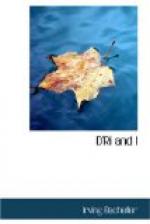INTRODUCTION
Chapter
I.
II.
III.
IV.
V.
VI.
VII.
VIII.
IX.
X.
XI.
XII.
XIII.
XIV.
XV.
XVI.
XVII.
XVIII.
XIX.
XX.
XXI.
XXII.
XXIII.
XXIV.
XXV.
XXVI.
XXVII.
[Transcriber’s Note: The chapters in the original text were numbered, but had no titles.]
LIST OF ILLUSTRATIONS
LOUISE
D’RI AND I
I COULD NOT TELL WHICH OF THE TWO GIRLS I LOVED THE BETTER
HE WOULD HAVE FOUGHT TO THE DEATH IF I HAD BUT GIVEN HIM WORD
“Come, now, my pretty prisoner”
“We ‘ll tek care O’ the ol’ brig”
WE WERE BOTH NEAR BREAKING DOWN
“Then I leave all for you”
INTRODUCTION
From a letter of Captain Darius Hawkins, U. S. A., introducing Ramon Bell to the Comte de Chaumont:—
“My dear count: I commend to your kind offices my young friend Ramon Bell, the son of Captain Bell, a cavalry officer who long ago warmed his sword in the blood of the British on many a battle-field. The young man is himself a born soldier, as brave as he is tall and handsome. He has been but a month in the army, yet I have not before seen a man who could handle horse and sword as if they were part of him. He is a gentleman, also, and one after your own heart, I know, my dear count, you will do everything you can to further the work intrusted to him.
“Your obedient servant,
“Darius Hawkins.”
From a letter of Joseph Bonaparte, Comte de Survilliers, introducing his friend Colonel Ramon Bell to Napoleon III of France:—
“He has had a career romantic and interesting beyond that of any man I have met in America. In the late war with England he was the master of many situations most perilous and difficult. The scars of ten bullets and four sabre-thrusts are on his body. It gives me great pleasure, my dear Louis, to make you to know one of the most gallant and chivalrous of men. He has other claims upon your interest and hospitality, with which he will acquaint you in his own delightful way.”
D’RI AND I
I
A poet may be a good companion, but, so far as I know, he is ever the worst of fathers. Even as grandfather he is too near, for one poet can lay a streak of poverty over three generations. Doubt not I know whereof I speak, dear reader, for my mother’s father was a poet—a French poet, too, whose lines had crossed the Atlantic long before that summer of 1770 when he came to Montreal. He died there, leaving only debts and those who had great need of a better legacy—my mother and grandmother.




